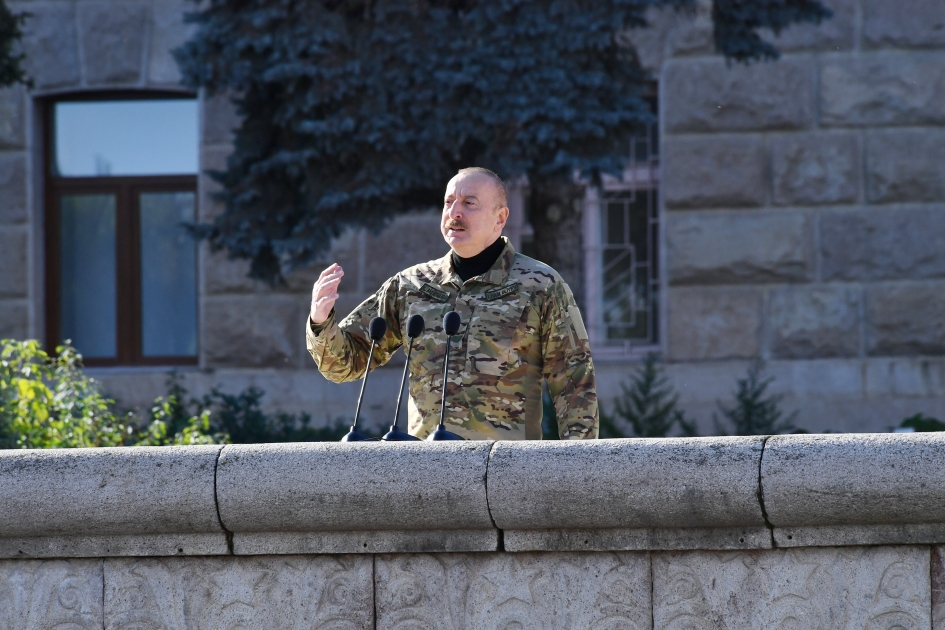"The West will have to accept the new realities in the region." Comment from Baku
Statements from Washington and Baku
The US State Department announced the cessation of military aid to Azerbaijan, suspension of meetings with officials from Baku, and advised building a road to Nakhichevan through the territory of Armenia. This was followed by a sharp response from the Azerbaijani Foreign Ministry. According to political observer Haji Namazov, the West will have to accept the new realities in the region and build its policy on their basis. “Otherwise, it risks losing all its levers of influence in the South Caucasus.”
- Early marriage in Azerbaijan – is the problem getting worse?
- “Armenia is not an outpost for the realization of foreign plans” – Pashinyan
- Russia is the biggest threat for 77 percent of Georgian citizens. IRI survey
What happened?
“The verbal altercation between the US State Department and the Azerbaijani Foreign Ministry is absolutely not accidental. I would say that the States were too late with their statements and therefore look, to put it bluntly, ridiculous.
The US Congress held hearings on the “situation in Nagorno-Karabakh”. The very discussion of the situation in the region of a particular country in the parliament of a state whose citizens were not and are not there does not lend itself to ordinary logic. But the US considers itself the master of the whole planet, so let’s not focus on this.
The deputy foreign policy chief of the United States made some harsh statements during the discussions. He said that the US will stop military assistance to Azerbaijan, from now on negotiations with high-ranking Azerbaijani officials will not be held, and official Baku should open regional transport through the territory of Armenia with the obligatory condition of preserving Armenia’s sovereignty over these routes.
Who really needs military aid?
“Azerbaijan does not need US military aid. At a time when the country’s budget includes billions of dollars for defense expenditures, millions from Washington are of almost no importance. But the US has always needed military assistance from Azerbaijan. Azerbaijani soldiers have served in Afghanistan and Kosovo. American military aircraft used Baku’s air harbor to transfer their forces to regional countries. The US authorities have repeatedly thanked Azerbaijan for its military assistance. In other words, it remains to be seen who needs who in this respect.
I would like to dwell on the notorious 907th amendment prohibiting military aid to Azerbaijan. It was adopted in Washington in 1992, at the height of the first Karabakh war, when the regions of Azerbaijan were occupied one after another. At that time, the US did not even want to hear about such a concept as territorial integrity of states, and deprived Baku of its assistance. At that time, the young state, which found itself in an extremely difficult situation, needed it.
And now the 907th amendment has been recalled again, allegedly to protect the territorial integrity of Armenia. What can we call this but hypocrisy?”
Azerbaijan has refused to negotiate
“Everything about the negotiations with the Azerbaijani side also looks somehow unconvincing. Immediately after the anti-Azerbaijani statements of the State Department, Azerbaijan refused the Bayramov-Mirzoyan talks in Washington scheduled for 20 November. Which is quite logical.
But the statement of the US State Department representative after all this about his country’s support for the peace process between Azerbaijan and Armenia is completely illogical. How he imagines it, probably nobody knows except Blinken.”
What was the reason for the allegations?
“And finally, most importantly. What is the real reason for all this fuss.
After Armenia turned sharply towards the West, Washington and Brussels quickly realised that they could tear this country away from Russia’s protectorate. But a strong argument is needed to make loud statements and cover up their presence with far-reaching intentions. At first, the Zangezur corridor issue, which was on the agenda in Baku and Moscow, played into the hands of the Western forces’ plans.
In other words, defense of Armenia against possible aggression of Azerbaijan to forcefully penetrate the corridor to Nakhichevan became the main thesis of the US and Europe.
These statements could have been timely then, but not now. Why?
Because Azerbaijan made a very strong move by declaring that it had lost interest in the Zangezur corridor. Baku has decided that it is easier to build a road to Nakhichevan through the territory of Iran than to seek it from Yerevan. First of all, because Yerevan offered nothing except beautiful statements in the spirit of “Crossroads of the World”. The road itself does not exist, it is not being built, and it is difficult to even imagine when the road itself will be ready on Armenian territory.
And here is Iran with ready infrastructure, which does not mind extra billions from the project connecting the East and the West. By the way, Iran is a net winner from everything that is going on, which can explain its flirtation with official Yerevan about the impossibility of the Zangezur corridor.
The West did not like this turn, as all their plans collapsed. What is the cover now, if no one needs the Zangezur corridor and Azerbaijan is not preparing for a new war for the south of Armenia?
Washington decided not to burden itself with long thoughts, and with one statement allegedly forbade Azerbaijan to build a road to Nakhichevan through Iran. But who can forbid Baku to build a road to its own territory through a neighbouring state that is not against it? There is no object of discussion here.
It is still unclear how all this will end. Only one thing is clear: the West will have to accept the new realities in the region and build its policy on their basis. Otherwise, it risks losing all its levers of influence in the South Caucasus.”




















